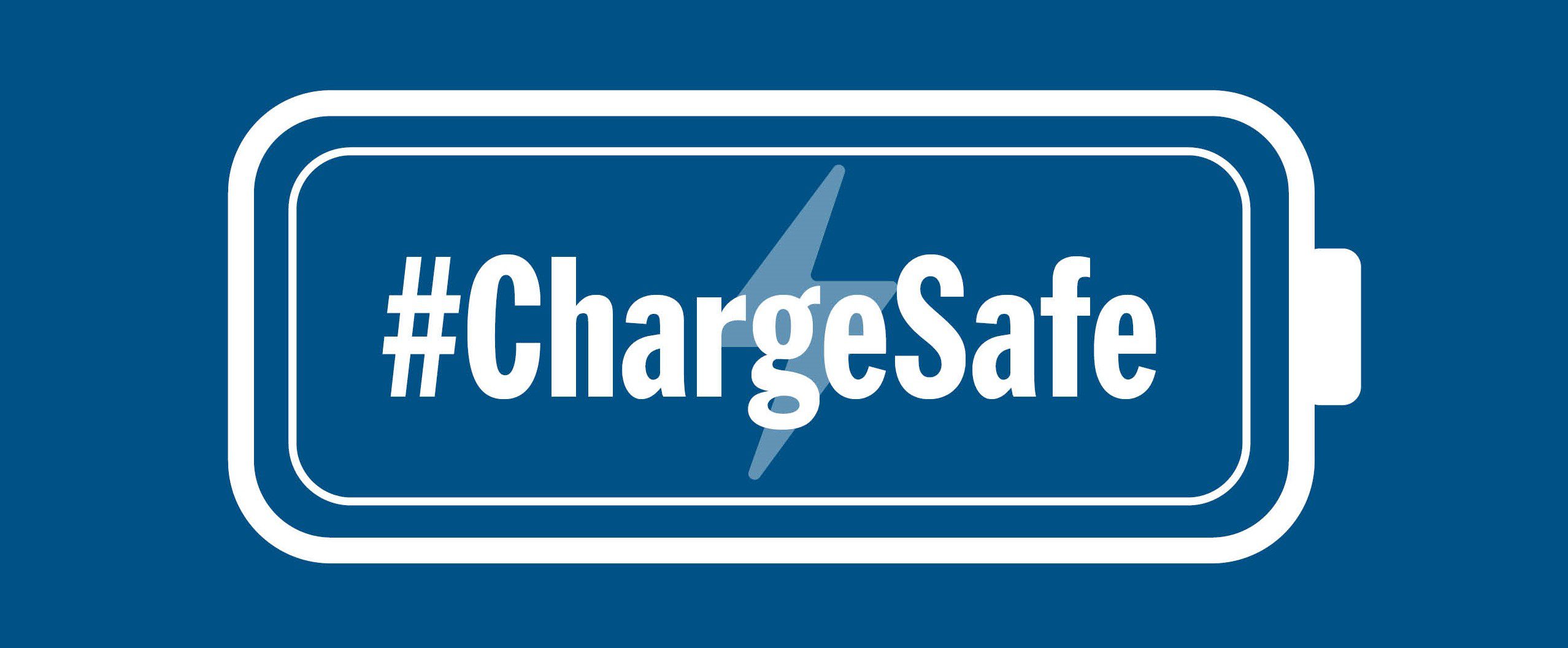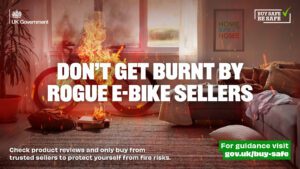Charge Safe
The majority of fires related to e-bikes and e-scooters have happened in homes. These fires often happen when charging batteries.
There are a number of ways you can reduce the risk of fire in the home.

Charging your e-bike or e-scooter
- Don’t charge e-bikes and e-scooters in bedrooms or where escape routes can be blocked – for example, hallways.
- Don’t leave your battery charging unattended, when you are out or while you are asleep.
- Don’t cover chargers or battery packs when charging
- Don’t overload sockets or use inappropriate extension leads
- Don’t charge or store batteries in direct sunlight or in hot locations (above 45⁰C)
- Don’t charge batteries close to combustible materials or hazardous substances.
- Always unplug your charger when you have finished charging
- If your battery can be removed from your e-bike or e-scooter and charged separately, it should be charged on a hard flat surface where heat can disperse and in area with good ventilation.
Warning signs your e-bike or e-scooter battery is a fire hazard
You must stop using or charging your battery immediately if you notice any of the following:
- Overheating: If your device’s battery feels extremely hot to the touch
- Deformation: If your battery looks swollen. Similar signs include any type of lump or leaking from the device.
- Noise: If your battery is making hissing or cracking sounds.
- Smell: If you notice a strong or unusual smell coming from the battery
- Performance: If your battery does not fully charge or is taking longer to charge than normal
- Smoke: If your battery or device is smoking
Maintaining your e-bike or e-scooter
- Always follow the manufacturer’s instructions for charging and using your product.
- Always use the manufacturer-approved battery and charger.
- If you need a replacement battery or charger for your e-bike or e-scooter go directly back to the manufacturer or retailer you bought it from to ensure it’s safe.
- Regularly inspect your product and check for damage or warning signs that your battery might be failing and becoming a fire risk.
- Don’t attempt to modify or tamper with your battery.
Buying e-bikes and e-scooters
- Only buy e-bikes, e-scooters, chargers and batteries from reputable retailers and manufacturers.
- Check the product is marked with a CE or UKCA mark to ensure they comply with UK product safety standards.
- Check product reviews before buying
- Register your product with the manufacturer to validate any warranties and make it easier for manufacturers to contact you in the event of a safety issue e.g. product recall.
- Check if products have been recalled by visiting the government Product Recalls and Alerts website
In the UK only e-scooters participating in official rental e-scooter trials may be used legally on roads. Other e-scooters are classed as Powered Transporters and cannot be used legally on the road. If you use an e-scooter illegally, you could face a fine and penalty points on your licence, and the e-scooter could be impounded.
E-Bike conversion kits
- Conversion kits change standard bicycles into e-bikes.
- It is recommended that a professional carries out an e-bike conversion. They will be responsible for ensuring that the e-bike is safe and fitted with the correct motor, battery and charger.
- Installing a conversion kit yourself could lead to safety issues with your e-bike and increase the risk of fire.
- Furthermore, it could invalidate the manufacturer’s warranty and make you responsible for any consequent damage or accident. If you modify an e-bike to increase its power or speed then it may no longer be legal to use on public roads.
Buy Safe Be Safe
The Department for Business and Trade launched the Buy Safe Be Safe campaign in October 2024. The campaign encourages positive consumer behaviour when buying and maintaining e-bike and e-scooter products.
Further information about the campaign can be found on the government website.
Resources in a number of languages are also available to support messaging.

NFCC responded to the Smarter Regulation: UK Product Safety Review consultation in October 2023. It looked the the UK’s product safety framework to protect consumers and help businesses bring new and innovative products to market. Our response drew, in part, on the experience of fire and rescue services in dealing with the the impact of product development and innovation outpacing safety standards.
NFCC has backed charity Electrical Safety First’s calls for improved safety standards of e-bike and e-scooter batteries. A change in legislation would be needed to help prevent fires and would ensure that the products in people’s homes are safer.
Clause 1: Safety Assurance – This clause mandates a third-party safety assessment, conducted by a government-approved body, for all e-bikes, e-scooters, and their lithium-ion batteries before they enter the UK market. This process mirrors safety measures in place for other high-risk products like fireworks and heavy machinery.
Clause 2: Responsible Disposal – This clause requires the Government to make regulations ensuring the safe disposal of lithium batteries once their lifecycle ends.
Clause 3: Comprehensive Fire Safety – This clause assigns the Government the responsibility of comprehensively addressing fire-related concerns. This involves enhancing safe usage, charging, and storage practices for these devices. It includes setting standards for conversion kits and charging systems, and consideration for a temporary ban on the sale of universal chargers that heighten fire risks.
